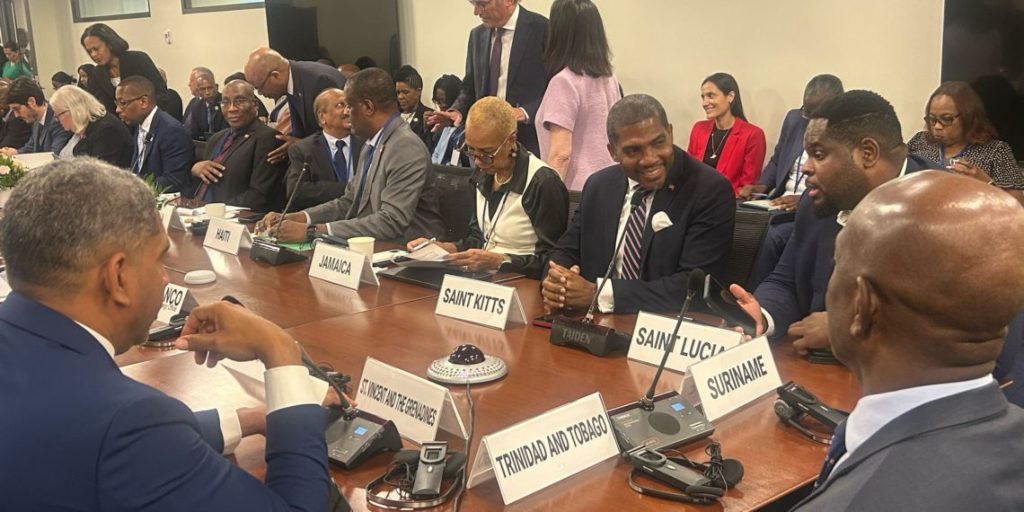Prime Minister Drew Champions Inclusion and Equity in World Bank Development Discussions.
Prime Minister Mark Brantley of St. Kitts and Nevis, in his capacity as the current chairman of the Caribbean Development Bank (CDB), delivered a powerful address at the World Bank Spring Meetings, emphasizing the urgent need for greater inclusion and equitable representation of Small Island Developing States (SIDS) in global development dialogues. He underscored the particular vulnerabilities of these nations, which face disproportionate challenges from climate change, economic shocks, and limited access to development financing, while often being excluded from the decision-making processes that directly impact their future. Brantley invoked the adage, “If you’re not at the table, you’re on the menu,” to drive home the critical point that without a seat at the table where global financial and developmental policies are formulated, SIDS risk being marginalized and their specific needs overlooked, potentially exacerbating their existing vulnerabilities.
Brantley’s address highlighted the structural disadvantages that SIDS often encounter in navigating the existing global financial architecture. He pointed to the prevalent practice of using GDP per capita as the primary metric for determining a country’s eligibility for concessional financing. This methodology, he argued, fails to capture the unique vulnerabilities of SIDS, like their susceptibility to natural disasters and their limited economic diversification, which often translates to greater exposure to external shocks. The dependence on this single, often misleading indicator effectively excludes many SIDS from accessing critical funding needed for climate resilience, sustainable development, and economic diversification, leaving them trapped in a cycle of vulnerability. He called for a more nuanced approach that takes into account the multifaceted challenges these nations face, advocating for the adoption of a multidimensional vulnerability index that provides a more accurate and comprehensive assessment of their specific needs and vulnerabilities.
The Prime Minister’s call for greater inclusion extends beyond simply having representation at the table. He stressed the importance of genuine partnership and meaningful engagement, where the voices of SIDS are not only heard but also actively incorporated into decision-making processes. He argued for a shift from the traditional donor-recipient dynamic to one based on mutual respect and shared responsibility, acknowledging the expertise and experience that SIDS bring to the table. Brantley emphasized that SIDS are not merely passive recipients of aid but active partners in development, possessing valuable insights and innovative solutions tailored to their unique contexts. This shift in perspective, he argued, is crucial for achieving sustainable and equitable development outcomes.
The impacts of climate change formed a significant part of Prime Minister Brantley’s address, underscoring the existential threat it poses to SIDS. He reiterated the urgency of accessing climate finance, highlighting the devastating consequences of delayed action. From rising sea levels and more frequent and intense extreme weather events to the loss of biodiversity and critical ecosystems, climate change presents a clear and present danger to the very survival of many island nations. He called for greater commitment from developed nations to fulfill their pledges on climate financing, emphasizing the need for readily accessible and streamlined processes to ensure that these funds reach the communities most in need. Delaying action, he warned, would not only exacerbate the impacts of climate change on SIDS but also undermine global efforts to achieve sustainable development goals.
Furthermore, Brantley advocated for innovative financing mechanisms tailored to the specific needs of SIDS. He highlighted the potential of debt-for-climate swaps and other innovative instruments that could provide much-needed fiscal space for investments in climate resilience and sustainable development. He also called for greater flexibility in the terms and conditions of development financing, recognizing the unique circumstances faced by SIDS, including their limited capacity to absorb large loans and the need for grant-based financing in certain situations. By exploring and implementing innovative financing solutions, Brantley argued, the international community could unlock significant resources for SIDS and empower them to build more resilient and sustainable economies.
In closing, Prime Minister Brantley’s address served as a powerful reminder of the interconnectedness of global challenges and the need for collaborative solutions. His advocacy for greater inclusion, equity, and a multidimensional approach to development financing for SIDS underscores the importance of recognizing the unique vulnerabilities and needs of these nations. By ensuring that SIDS have a seat at the table and a voice in shaping global development policies, the international community can work towards more just, equitable, and sustainable development outcomes for all. The call to action is clear: move beyond rhetoric and embrace genuine partnership with SIDS, recognizing them as equal partners in building a more resilient and prosperous future for the planet. This necessitates not only increased financial support but also a fundamental shift in the global development paradigm, acknowledging the agency and expertise of SIDS in shaping their own destinies and contributing to global solutions.
Share this content:












Post Comment